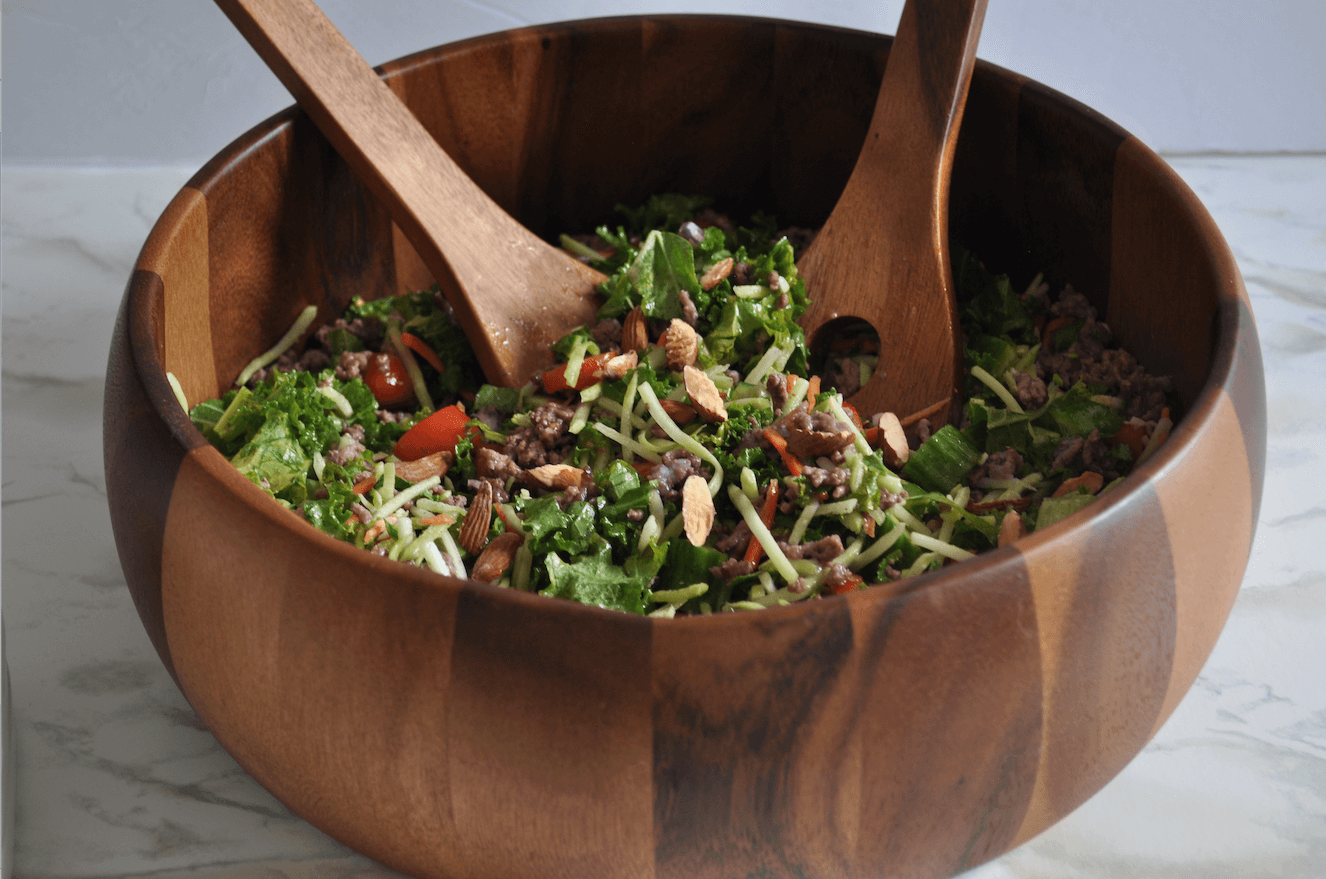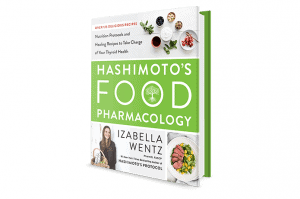
![]()
Sometimes a fresh salad is just what we need for a light and healthy dinner. In this recipe, I blend broccoli slaw, as well as some extra kale, cucumbers and tomatoes for a good dose of vitamins, minerals and fiber! The lemon juice is also a great addition to make this dish bright, as well as support liver health.
Prep time: 5 minutes
Serves: 4
Ingredients
½ pound cooked ground beef
Sea salt/pink Himalayan salt to taste
Pepper to taste (if tolerated)
2 cups broccoli slaw
2 cups chopped kale
½ cup diced cucumber
½ cup cherry tomatoes, sliced
½ cup chopped almonds
¼ cup extra virgin olive oil
4 tablespoons fresh lemon juice
1 tablespoons apple cider vinegar
1 clove garlic, minced
Directions
1. In a large bowl, mix the first 8 ingredients (beef through almonds).
2. In a small bowl, whisk the remaining ingredients and pour over the salad.
3. Toss and serve.
Nutritional Analysis per Serving: Protein (g) 18.67; Fat (g) 27.91; Carbs (g) 11.25; B12 (mcg) 1.55; Iron (mg) 2.96; Iodine (mcg) 0; Magnesium (mg) 66.93; Potassium (mg) 642.35; Selenium (mcg) 12.88; Sodium (mg) 217
 Food can be a powerful ally. In the same way that we use pharmaceuticals, we can use food as our medicine. Nourishing your body through food pharmacology is one of the fastest ways to tell your body it is safe and can start healing. Click here to order your copy of my new cookbook, Hashimoto’s Food Pharmacology: Nutrition Protocols and Healing Recipes to Take Charge of Your Thyroid Health, today and please share with all the ones you love!
Food can be a powerful ally. In the same way that we use pharmaceuticals, we can use food as our medicine. Nourishing your body through food pharmacology is one of the fastest ways to tell your body it is safe and can start healing. Click here to order your copy of my new cookbook, Hashimoto’s Food Pharmacology: Nutrition Protocols and Healing Recipes to Take Charge of Your Thyroid Health, today and please share with all the ones you love!

 Disclosure: As an Amazon Associate I earn from qualifying purchases. We are a professional review site that receives compensation from the companies whose products we review. We test each product thoroughly and give high marks to only the very best. We are independently owned and the opinions expressed here are our own.
Disclosure: As an Amazon Associate I earn from qualifying purchases. We are a professional review site that receives compensation from the companies whose products we review. We test each product thoroughly and give high marks to only the very best. We are independently owned and the opinions expressed here are our own.
Hi Izabella, I have followed you for some time now. I am very curious about how you suggest raw kale and broccoli slaw for hypo thyroid, it was my understanding that raw goitrogens were bad for thyroid conditions. Also for green smoothies, aren’t most of the greens like mustards, spinach. bok choys etc also inhibiting for hypo thyroid conditions? Everywhere I look there are suggestions for people suffereing from Hypo thyroid to make smoothies with these raw veggies – finding it pretty confusing.
Shelley – thank you for reaching out! <3 I understand how frustrating and confusing this can be. There is a myth that foods known as goitrogens, such as cruciferous vegetables, are not good for those with Hashimoto's. Iodine deficiency is not widespread in people with Hashimoto’s, and so eating cruciferous vegetables (unless you are sensitive to them) is perfectly healthy for people with Hashimoto’s and should not impact thyroid function. In the case that a person does have hypothyroidism due to iodine deficiency, he/she can still enjoy crucifers as long as they are cooked or fermented. Cooking/fermenting will break down the iodine blocking content. You can read more about the breakdown of the science behind the thyroid and goitrogens here: https://thyroidpharmacist.com/articles/what-are-goitrogens-and-do-they-matter-with-hashimotos/
I think grilled chicken or beef or pork would be good on this salad too 😉
Marcia – thank you so much! I think those sound like wonderful additions! <3
It ‘s a vers interesting idea! I was just wondering about the beef for dinner. The animal protein is not à good idea for the night.what do you think? Thanks
Nabila – thank you for sharing! Everyone is different, I recommend listening to your body.
Dr. Wentz,
I am a little confused on the almonds. I thought they were not recommended for Hashimoto’s? Can you clarify that for me?
Thanks!
Tara – thank you for following. People follow different diets depending on the protocols they’re following, or the stage of healing they’re at. (For example, I recommend the Root Cause Intro diet, which allows for nuts/seeds and legumes but removes gluten/dairy/soy/sugar/alcohol/caffeine, during the Liver Support Protocol.) After identifying and eliminating food sensitivities, and healing, many people are able to reintroduce some foods back into their diet.
It’s important to remember that everyone will have unique sensitivities. So be sure to only follow recipes that do not contain foods you may be sensitive to.
Here are a couple resources you might find helpful as well.
BEST DIET FOR HASHIMOTO’S AND HYPOTHYROIDISM
https://thyroidpharmacist.com/articles/best-diet-for-hashimotos-hypothyroidism
COMMON QUESTIONS ABOUT DIET AND THYROID
https://thyroidpharmacist.com/articles/common-questions-about-diet-and-thyroid